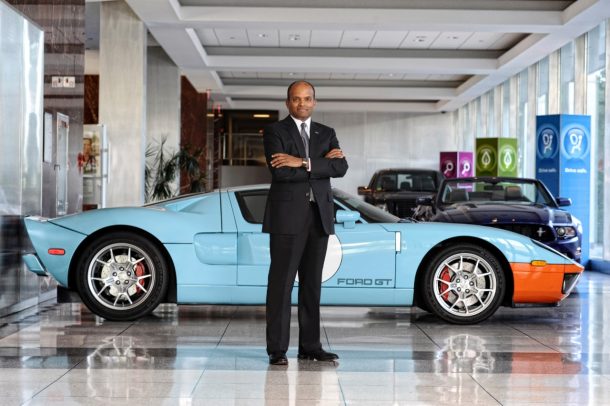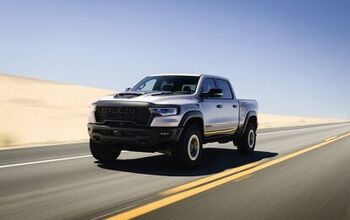Former Product Chief Nair to Head Ford North America; Armstrong Moves Up

After Monday’s corporate shakeup at Ford Motor Company, which saw former CEO Mark Fields replaced with Jim Hackett and the elevation of Joe Hinrichs and Jim Farley up company ranks, the automaker has announced more appointments.
To fill the job left by Hindrichs, who moved from president of Ford North America to head of global operations, Ford has named its product development boss and chief technical officer as a successor. Raj Nair, 52, will officially take on the role June 1st, reporting to Farley, Ford’s new head of global markets.
Below Nair, a slew of changes are afoot.
Ford of Europe’s current chief operating officer, Steven Armstrong, will gain a new title at the same time: head of Ford of Europe, Middle East & Africa. The executive, a former president of Ford South America, was COO of Volvo when Ford sold the Swedish brand to Geely Automotive Holdings Ltd.
The head of Ford’s Asia-Pacific division, Dave Schoch, will soon be going on longer vacations. The 40-year company veteran, who has held high-ranking positions in all of Ford’s regions, plans to retire at the age of 66. He’ll hand the reins over to current Asia sales director Peter Fleet on July 1st.
“Over the past five years, Dave has been a key architect of our tremendous growth in China, and overall success in Asia Pacific,” said CEO Jim Hackett in a company release.
Other changes among top brass include the naming of Mark Ovenden as vice president, Marketing, Sales and Service, Asia Pacific. Ovenden previously oversaw Ford’s Russian operations. To fill the new position of vice president of autonomous vehicles and electrification, Ford has appointed product development executive Sherif Marakby.
Hau Thai-Tang, a 25-year product development veteran who spearheaded engineering for former CEO Alan Mulally’s One Ford plan, has been named vice president, Product Development and Purchasing. From that post, he’ll oversee all of Ford’s global engineering, design and R&D efforts.
Other appointments include Neil Schloss’ elevation to vice president and chief financial officer of Ford’s mobility division, and Jeff Lemmer’s new role as vice president and chief operating officer of Information Technology. Both of these men will report to mobility head Marcy Klevorn. Ken Washington, current VP of research and advanced engineering, will take on the role of vice president for research and advanced engineering, as well as chief technology officer, on June 1st.
[Image: Ford Motor Company]

More by Steph Willems
Latest Car Reviews
Read moreLatest Product Reviews
Read moreRecent Comments
- Kjhkjlhkjhkljh kljhjkhjklhkjh A prelude is a bad idea. There is already Acura with all the weird sport trims. This will not make back it's R&D money.
- Analoggrotto I don't see a red car here, how blazing stupid are you people?
- Redapple2 Love the wheels
- Redapple2 Good luck to them. They used to make great cars. 510. 240Z, Sentra SE-R. Maxima. Frontier.
- Joe65688619 Under Ghosn they went through the same short-term bottom-line thinking that GM did in the 80s/90s, and they have not recovered say, to their heyday in the 50s and 60s in terms of market share and innovation. Poor design decisions (a CVT in their front-wheel drive "4-Door Sports Car", model overlap in a poorly performing segment (they never needed the Altima AND the Maxima...what they needed was one vehicle with different drivetrain, including hybrid, to compete with the Accord/Camry, and decontenting their vehicles: My 2012 QX56 (I know, not a Nissan, but the same holds for the Armada) had power rear windows in the cargo area that could vent, a glass hatch on the back door that could be opened separate from the whole liftgate (in such a tall vehicle, kinda essential if you have it in a garage and want to load the trunk without having to open the garage door to make room for the lift gate), a nice driver's side folding armrest, and a few other quality-of-life details absent from my 2018 QX80. In a competitive market this attention to detai is can be the differentiator that sell cars. Now they are caught in the middle of the market, competing more with Hyundai and Kia and selling discounted vehicles near the same price points, but losing money on them. They invested also invested a lot in niche platforms. The Leaf was one of the first full EVs, but never really evolved. They misjudged the market - luxury EVs are selling, small budget models not so much. Variable compression engines offering little in terms of real-world power or tech, let a lot of complexity that is leading to higher failure rates. Aside from the Z and GT-R (low volume models), not much forced induction (whether your a fan or not, look at what Honda did with the CR-V and Acura RDX - same chassis, slap a turbo on it, make it nicer inside, and now you can sell it as a semi-premium brand with higher markup). That said, I do believe they retain the technical and engineering capability to do far better. About time management realized they need to make smarter investments and understand their markets better.


































Comments
Join the conversation
What was Adam promoted too?
Nair and Farley know the business inside and out, these seem like smart moves, though I think Fields was a sacrificial lamb to appease the shareholders. None of these moves, btw, seem to show that FoMoco is abandoning Field's push into autonomy and mobility. Maybe it's because of Henry Ford's personal bigotries, but I couldn't help but notice Indian, Vietnamese, Arabic and Jewish surnames. If you choose talent, you'll almost necessarily end up with a diverse pool of workers.